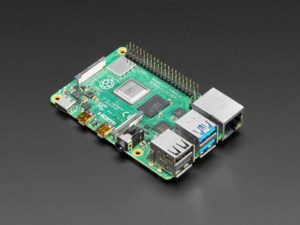 I find it hard not to be fascinated with technology these days. The advances that I’ve seen just in my lifetime have been astounding. One of the devices that I have come to know and love over the past few years is the microcontroller. A microcontroller is basically a small computer. It contains one or more central processing units, memory storage and programmable input/output peripherals. Don’t let that scare you, it’s just a fun little computer that is capable of executing various functions for devices, based on the needs of its program.
I find it hard not to be fascinated with technology these days. The advances that I’ve seen just in my lifetime have been astounding. One of the devices that I have come to know and love over the past few years is the microcontroller. A microcontroller is basically a small computer. It contains one or more central processing units, memory storage and programmable input/output peripherals. Don’t let that scare you, it’s just a fun little computer that is capable of executing various functions for devices, based on the needs of its program.
Microcontrollers are Everywhere
Microcontrollers can be found all over the place. They are in automobile engine control systems, implantable medical devices, remote controls, office machines, appliances, power tools, toys and other embedded systems. They’re everywhere. The use of microcontrollers has gained a lot of popularity over the last few years among hobby enthusiast and DIY’ers. A big part of this is because these little computers have allowed us to stretch our imagination and creativity through personal projects and/or business ventures. They are often used to prototype inventions before patent applications, or to just create something fun and useful around the house, such as an automatic pet feeder. The best thing about these little computers is that you do not need to be an engineer or some super programmer in order to use them and build your own creative projects.
Types of Microcontrollers
There are many different types of microcontrollers out there. Some of them are better suited for industrial projects while others may be more suited for novice projects. Rather than take the time and make this post extremely lengthy about the various types of microcontrollers, I’d like to highlight two of the more popular microcontrollers that many hobby enthusiast and DIYer’s are using today. Those two microcontrollers are the Arduino, and the Raspberry Pi. A Raspberry Pi is pictured above while a video on the Arduino is embedded below. Either one of these boards is great for anyone who is interested in creating a personal project. If you are new to microcontrollers then there are added benefits to using either one of these two boards. One benefit is their popularity. Because of their popularity they both have established communities on-line where anyone could access information and/or advice on a particular project through forums and discussions. Another benefit is the vast amount of open source software out there for beginners. You may gain inspiration by looking over a few open source projects on-line, or you may come across a particular line of code that you find to be a perfect addition to that little widget you’ve created.
Sample Projects
Now, you can specifically search for Raspberry Pi projects and Arduio projects on-line but I’d also like to share this fun little website that I found, hackster.io. While it is not an exclusive site for Arduino or Raspberry Pi projects, you can still use their filter to find projects for your board. It is a great site for anyone looking for personal projects to work on, or anyone who is in need of a little inspiration to get started.
Acquiring a Microcontroller
If you are thinking about buying a microcontroller then there are several types of Raspberry Pis and Arduinos out there. I suggest reading the reviews on each board in order to get an idea of which one may better serve your project needs and level of expertise. I would also suggest buying a kit if you are deciding to actually get a board. A kit will often have a board along with various components to get you started, and it will likely have sample project tutorials which are great for beginners. Buying a kit can save you money in the long run depending on how big your project is, or how many components you may need in the future. A project can easily become more expensive if you buy one component at a time for the duration of the build. I’ve provided Amazon links that may show a build kit below. If the build kit is not shown below, you can still click on one of the items and it will take you to the Amazon site where you can search for a board, additional components, or a build kit. I also mention my Amazon affiliation below, letting readers know that I will receive a commission from Amazon if anything happens to be purchased using the links provided. Any money made from this site is used to used to improve performance, content, and maintenance of this site.
A little Inspiration
The last thing that I would like to share is a TED Talk video on the Arduino microcontroller. It’s an older video but I still think that its a great video that may provide a little bit of inspiration to anyone who is thinking of starting a DIY microcontroller project.
If you would like to subscribe to the STEMVoodoo.com mailing list, please enter your your first name and email below.
[mailpoet_form id=”2″]STEMVoodoo.com is a participant in the Amazon Services LLC Associates Program, an affiliate advertising program designed to provide a means for sites to earn advertising fees by advertising and linking to Amazon.com.
[amazon_auto_links id=”685″]